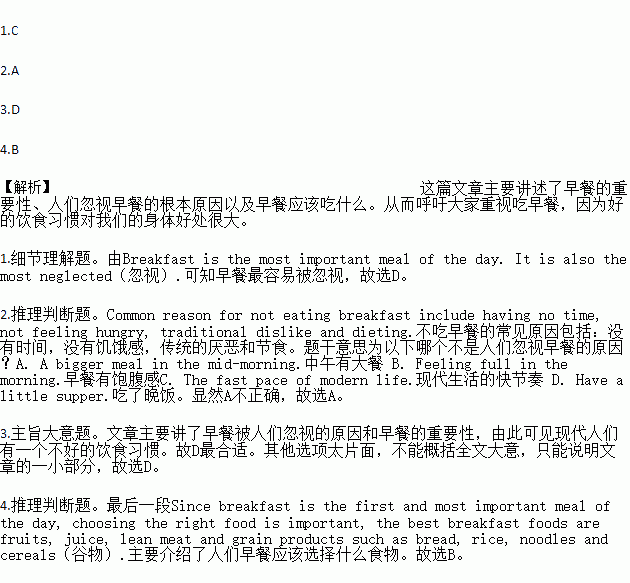题目内容
Breakfast is the most important meal of the day. It is also the most neglected(忽视).Common reason for not eating breakfast include having no time, not feeling hungry, traditional dislike and dieting.
Breakfast simply means “break the fast”. Your body spends at least 6 to 12 hours each night in a fasting state. In the morning your body needs energy for the day’s work ahead.
A good breakfast should provide 1/3 of your total calorie(卡路里)needs for the day. On average,we eat 400 less calories for breakfast than for dinner. If breakfast doesn’t attract you in the morning, try eating a lighter dinner earlier in the evening or save half of your dinner for breakfast in the morning.
Some people fear that eating breakfast will make them hungrier during the day and they will eat more. It is true that eating breakfast is likely to make feel hungry throughout the day. That is because your body id working correctly. Although you may feel as if you are eating more all day long, in reality you are probably not. Not eating breakfast can also cause you to overeat, since a fall in blood sugar often makes you feel very hungry later.
Since breakfast is the first and most important meal of the day, choosing the right food is important, the best breakfast foods are fruits, juice, lean meat and grain products such as bread, rice, noodles and cereals(谷物).
1.Which meal is the most neglected according to the passage?
A. Supper. B. Lunch.
C. breakfast. D. dinner.
2.Which is not the reason for people to miss breakfast?
A. A bigger meal in the mid-morning. B. Feeling full in the morning.
C. The fast pace of modern life. D. Have a little supper.
3.The best title for this article is_____.
A. Diet and Breakfast. B. Breakfast: Well Begin, Half Done.
C. What is a Good Breakfast D. Bad Eating Habits of Modern People
4.In the last paragraph,the writer mainly__________.
A. persuades us to have a good breakfast
B. tells us what food we should have for breakfast
C. tells us what food isn't suitable for breakfast
D. describes when and how we should have our breakfast.
Nowhere is the place you never want to go. It’s not on any departure board, and though some people like to travel so far off the motherland that it looks like Nowhere, most wanderers ultimately long to get somewhere. Yet every now and then—if there’s nowhere else you can be and all other options have gone—going nowhere can prove the best adventure around.
Nowhere is entirely uncharted; you’ve never read a guidebook entry on it or followed others’ suggestions on a train ride through its suburbs. Few YouTube videos exist of it. Moreover, it’s free from the most dangerous kind of luggage, expectation. Knowing nothing of a place in advance opens us up to a high energy we seldom encounter while walking around Paris or Kyoto with a list of the 10 things we want—or, in embarrassing truth, feel we need—to see.
I’ll never forget a bright January morning when I landed in San Francisco from Santa Barbara, just in time to see my connecting flight to Osaka take off. I hurried to the nearest airline counter to ask for help, and was told that I would have to wait 24 hours, at my own expense, for the next day’s flight. An unanticipated delay is exactly what nobody wants on his schedule. The airline didn’t answer for fog-related delays, a gate agent declared, and no alternative flights were available.
Millbrae, California, the drive-through town that encircles San Francisco’s airport, was a mystery to me. With one of the world’s most beautiful cities only 40 minutes to the north, and the unofficial center of the world, Silicon Valley, 27 miles to the south, Millbrae is known mostly as a place to fly away from, at high speed.
It was a cloudless, warm afternoon as a shuttle bus deposited me in Millbrae. Locals were taking their dogs for walks along the bay while couples wandered hand in hand beside an expanse of blue that, in San Francisco, would have been crowded with people and official “attractions.” I checked in to my hotel and registered.
Suddenly I was enjoying a luxury I never allow myself, even on vacation: a whole day free. And as I made my way back to my hotel, lights began to come on in the hills of Millbrae, and I realized I had never seen a sight half so lovely in glamorous, industrial Osaka. Its neighbor Kyoto is attractive, but it attracts 50 million visitors a year.
Who knows if I’ll ever visit Millbrae again? But I’m confident that Nowhere will slip into my schedule many times more. No place, after all, is uninteresting to the interested eye. Nowhere is so far off the map that its smallest beauties are a discovery.
The Unexpected Joys of a Trip to Nowhere | |
Passage outline | Supporting details |
Introduction to Nowhere | ●Although many choose to travel beyond the 1., they actually hope to get somewhere. ●Getting nowhere can be the best adventure when we are2. out of options. |
3. of Nowhere | ●You don’t have to be 4. on a guidebook entry or others’ advice. ●With limited information of a place and little expectation, we will encounter a 5. high energy that doesn’t exist when visiting Paris or Kyoto. |
The author’s experience of getting nowhere | ●The airline wasn’t 6. for unexpected delays and there were no alternative flights available. ●He decided to visit the mysterious Millbrae,7. between San Francisco and Silicon Valley. ●He 8. to enjoy such a luxurious and free time in big cities before. |
Conclusion | ●Though 9. about whether to visit Millbrae again, Nowhere will be included in his schedule. ●Nowhere is entirely uncharted with its beauties to be 10.. |

